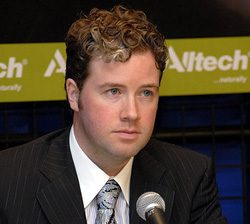The latest company to get into the cellulosic biofuels race is Alltech of Lexington, Kentucky. The company was awarded a grant last week by the US Department of Energy to begin work on a $70 million plant in Springfield, Ky.
 The head of that project is Dr. Mark Lyons, son of Alltech president Dr. Pearse Lyons. This young man has inherited the business and scientific intelligence of his father and already has experience that will help him make this plant a reality in short order, having been in charge of international projects for the company, including the largest yeast plant in the world located in Brazil.
The head of that project is Dr. Mark Lyons, son of Alltech president Dr. Pearse Lyons. This young man has inherited the business and scientific intelligence of his father and already has experience that will help him make this plant a reality in short order, having been in charge of international projects for the company, including the largest yeast plant in the world located in Brazil.
Mark Lyons says the $30 million DOE grant will make the project much easier to accomplish. “This gives us the possibility to think much bigger than we would have been forced to,” he said in an interview. “And that means that the time frame to get where we want to will be that much shorter.”
The facility Alltech is planning will be a commercial cellulosic ethanol plant. “I think the fact that Alltech is positioned so strongly in the animal feed and the animal health business and that we have this background and knowledge of the ethanol business, we’re really in a unique position,” said Lyons. “We have a very definite plan, we’re very confident, and essentially this is an idea that we actually had 30 years ago.”
This week Alltech has been hosting an international symposium, appropriately titled for an Earth Day theme “The Greenest Generation,” which has focused on a variety of issues important to agriculture, the environment and the world. Some 1700 participants from all over the world have been attending.
“We have to take this challenge,” Lyons said with regard to the theme. “We want more energy globally, more food, and we have to do that with less impact on the environment.”
You can listen to an interview with Mark Lyons from the Alltech Symposium here: [audio:http://www.zimmcomm.biz/alltech/alltech-symposium-08-mark-lyons.mp3]
 Aerospace engineer and author Robert Zubrin has been getting some media attention lately for his book, “Energy Victory,” in which he outlines a simple plan for “winning the war on terror by breaking free of oil.” Most recently, he was featured on a segment of the Business News Network, a popular nationwide TV show in Canada.
Aerospace engineer and author Robert Zubrin has been getting some media attention lately for his book, “Energy Victory,” in which he outlines a simple plan for “winning the war on terror by breaking free of oil.” Most recently, he was featured on a segment of the Business News Network, a popular nationwide TV show in Canada.

 With the Brazilian massive sugar cane crops being turned into ethanol and Americans leading the way in biodiesel production, it was just a matter of time before these two biofuels giants put their heads together to combine the best of both worlds.
With the Brazilian massive sugar cane crops being turned into ethanol and Americans leading the way in biodiesel production, it was just a matter of time before these two biofuels giants put their heads together to combine the best of both worlds. A pipeline that has carried gasoline the 104 miles from the Port of Tampa to the Orlando since the mid-1960s could soon be carrying ethanol across the Sunshine State.
A pipeline that has carried gasoline the 104 miles from the Port of Tampa to the Orlando since the mid-1960s could soon be carrying ethanol across the Sunshine State. The two sons of a man who runs the green initiatives portion of a New York metro area company that rents out chillers, air conditioners, generators, electric heaters, oil-fired heaters, comfort cooling, air compressors, propane and natural gas heat, and portable air handlers have come up with what they hope becomes an international symbol for biodiesel (pictured left).
The two sons of a man who runs the green initiatives portion of a New York metro area company that rents out chillers, air conditioners, generators, electric heaters, oil-fired heaters, comfort cooling, air compressors, propane and natural gas heat, and portable air handlers have come up with what they hope becomes an international symbol for biodiesel (pictured left).



 The head of that project is Dr. Mark Lyons, son of Alltech president Dr. Pearse Lyons. This young man has inherited the business and scientific intelligence of his father and already has experience that will help him make this plant a reality in short order, having been in charge of international projects for the company, including the largest yeast plant in the world located in Brazil.
The head of that project is Dr. Mark Lyons, son of Alltech president Dr. Pearse Lyons. This young man has inherited the business and scientific intelligence of his father and already has experience that will help him make this plant a reality in short order, having been in charge of international projects for the company, including the largest yeast plant in the world located in Brazil. A study by researchers at Michigan State University says that an enzyme from a microbe that lives in cows’ stomachs could help get more ethanol out of corn.
A study by researchers at Michigan State University says that an enzyme from a microbe that lives in cows’ stomachs could help get more ethanol out of corn.